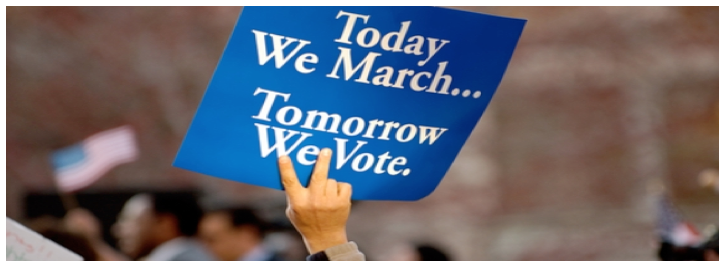LATINO VOICE-The United States Census of 2010 tells us that the nation's Latino population increased by 15.2 million between 2000 and 2010 and accounted for more than half of the total U.S. population increase of 27.3 million. Between 2000 and 2010, the Hispanic population grew by 43 percent, or four times the nation's 9.7 percent growth rate.
This Census counted 54 million Latinos making up 17 percent of the U.S. population. According to the Pew Research Center a record 25.2 million Latinos were eligible to vote in the 2014 midterm elections. If Latinos came out to vote in the same manner as it is for black or white voters, their share of the electorate would be around 17 percent—double what it is today.
In March of 2014 Latinos surpassed the number of non-Hispanic whites living in California, and Latinos are now the state’s largest racial group. However, this change has not reached out the voting booth yet. According to the Public Policy Institute of California whites make up only 44% of California’s adult population but represent 62% of the state’s likely voters. In contrast, Latinos comprise 34% of the adult population but just 17% of likely voters.
Reporters, analyst and the media, spend a lot of time discussing and analyzing this important voting block in every election. They talk about how it’s changing the political landscape; they keep talking about the “Sleeping Giant” of the Latino vote. But why is it that this giant is still sleeping? Can it possible be that the alarm hasn’t gone off? Or isn’t loud enough? If so why is it that Latinos don’t vote as much as other groups?
According to the New York Times article Why Hispanics Don’t Have a Larger Political Voice, Latinos don’t vote because they are the most marginalized group in America, many are ineligible to vote due to age or citizenship, and those who can vote don’t.
I’d like to add to this list the Cultural Factor. I can’t speak for all Latin American countries but during most of the twentieth century, Mexico remained under the control of one political party. It was not until the 2000 presidential election that a two-party system emerged. For all this time, many Mexicans didn’t think voting made a difference, “the same party in power always wins, so why bother to vote.” Because of this, Latinos or perhaps more specifically Mexican Americans don’t rush to the polls on Election Day. Regular voting is not embedded in our psyche.
Many Latinos are busy making a living, providing for their families, or working two or perhaps three jobs at a time, that voting is their least of their concerns. But the truth is that voting does make a difference, and our influence in politics will continue to rise albeit slowly. I think that as they get older, young Latinos who are just becoming eligible to vote will start to make it a habit. Democrats can’t take us from granted and Republicans need to do a better job of caring about the issues that are important to us.
The future looks bright for American Latinos, the future looks bright for all Americans. The Sleeping Giant will wake up, and will never go back to sleep.
(Fred Mariscal came to Los Angeles from Mexico City in 1992 to study at the University of Southern California and has been in LA ever since. He is a community leader who serves as Vice Chair of the Los Angeles Neighborhood Council Coalition and sits on the board of the Greater Wilshire Neighborhood Council representing Larchmont Village. He was a candidate for Los Angeles City Council in District 4. Fred writes Latino Perspective for CityWatch and can be reached at: [email protected] )
-cw
CityWatch
Vol 13 Issue 45
Pub: Jun 2, 2015
Sidebar

 CityWatch Los Angeles
Politics. Perspective. Participation.
CityWatch Los Angeles
Politics. Perspective. Participation.
04
Sat, May
